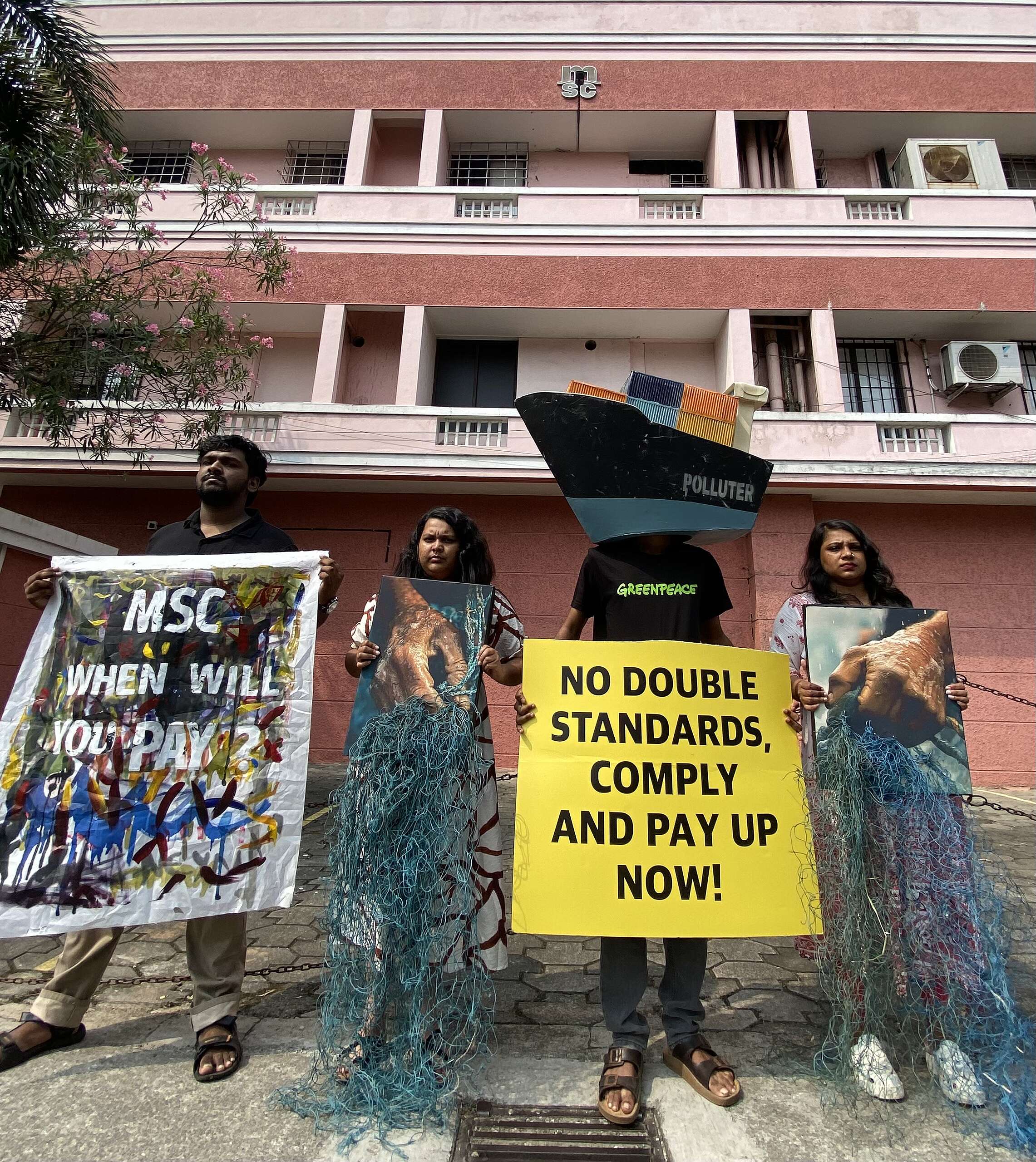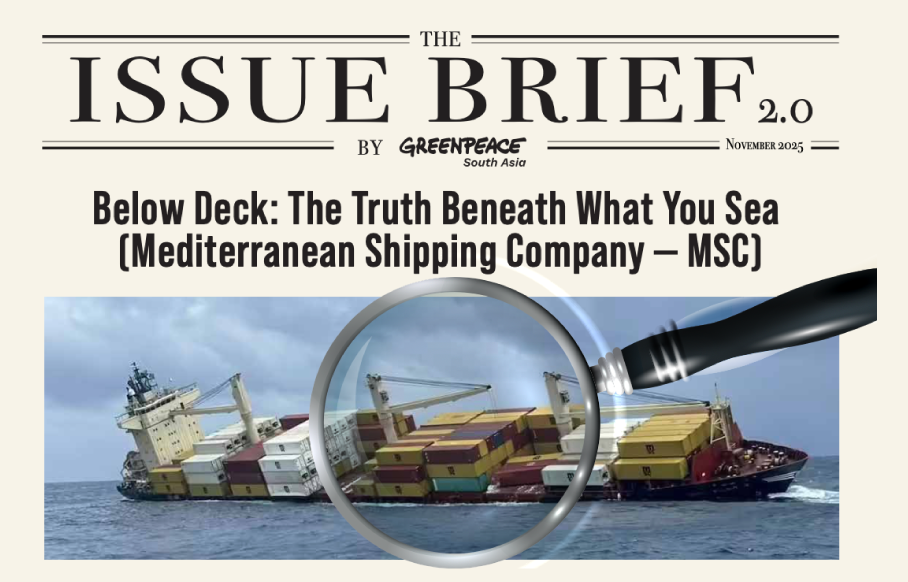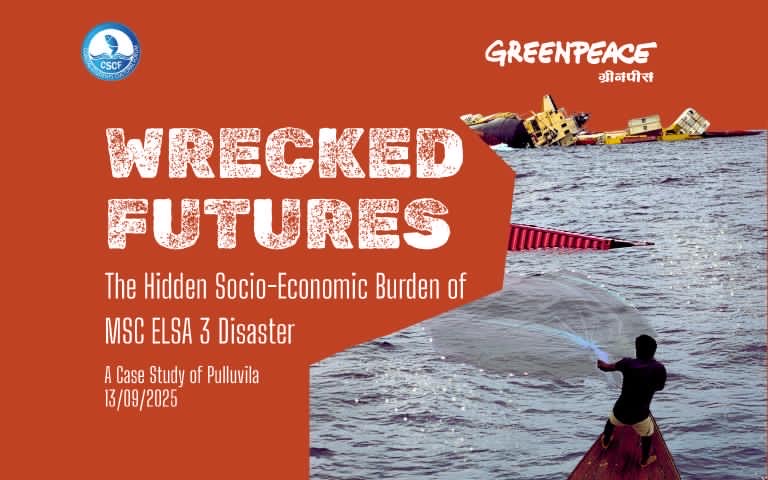Report reveals women fish sellers were unable make daily earnings after MSC ELSA 3 shipwreck
Thiruvananthapuram, 16 September, 2025 – In a press conference held in Thiruventhapuram, Kerala, citizen groups including fish workers unions, church leaders and Greenpeace India today launched a new report “Wrecked Futures: The Hidden Socio-Economic Burden of MSC ELSA 3 Disaster” that highlights the devastating toll the MSC ELSA 3 shipwreck has had on Kerala fishing households using Pulluvila village case studies. The findings paint a stark picture of economic disruption, social distress, and long-term vulnerability, coinciding with recent legal developments that show a wide gap between community losses and the compensation that may ultimately be awarded.
According to the report which was collaborated with the Karimkulam Gramapanchyat in Thiruvananthapuram, the average fishing household in Pulluvila has lost between ₹25,000–₹35,000 per month since the incident, in a community where more than 80% of families had no savings to fall back on. Of the 12 wards that were surveyed, 96% of people are directly tied to fishing, whether as boat owners, wage workers, or fish sellers. Testimonies reveal a cascading crisis: plastic nurdles released from the wreckage have disrupted fish colonies, damaged nets and boat engines, and forced longer travel routes, inflating daily operational costs. With nets costing around ₹25,000 each and recovery expenses exceeding ₹1 lakh in some cases, many families face debts they are not able to repay. During the study, women fish vendors who used to earn at least ₹3,000 a day in net profits reported being unable to sell their catch due to consumer fears about contamination.
Some key highlights of the report include:
- Over 80% of households surveyed had no savings to withstand the income shock.
- Boat maintenance costs per trip now range from ₹7,000–₹10,000, often unrecoverable with low yields.
- Fishing net damage has added recovery costs of over ₹1 lakh, wiping out annual household incomes.
- Market confidence collapse has hurt women fish sellers most, leaving them unable to earn even daily subsistence.
- Mental health strain and rising debts are compounding long-term impacts, with families forced into new loans to cover school and college fees.
“I have written a letter to the fisheries department, showing my losses which go up to 70,000 for damages to my nets and engine because of the plastic and container debris. Now, I am unable to operate my boat because of the expenses and that has pushed me to work as a worker in another boat for lower wages,” said Denson, a 43-year-old fish worker from Pulluvila Village. “Besides the financial impact, families report mounting anxiety over paying school and college fees, maintaining household expenses, and taking on new loans to survive. The report clearly shows that beyond income loss, the wreckage has left lasting scars on a community that is already more vulnerable to climatic extremes,” said Rethin Antony, Ward member, Karumkulam Grama Panchayat, President (CSCF).
The findings arrive at a time when compensation claims are under scrutiny. The Kerala government has filed an admiralty suit seeking ₹9,531 crore to cover environmental damage, pollution remediation, and livelihood losses. To reduce their liability and curb future claims, the owners of MSC ELSA 3 have issued a public notice estimating their liability at only ₹132 crore. This has created deep concern among local communities and civil society groups, who fear that the eventual payout may fall far short of actual damages.
“This is not just about one village, but a peek into the realities of coastal villages across the impacted region. . This is about corporate negligence and evasion of accountability by MSC. They should not be allowed to undercut the compensation by using loopholes in the legal and policy system. Any settlement that does not reflect real losses will amount to injustice for Kerala’s coastal families,” Amruta S.N., climate campaigner at Greenpeace India.
“This move is a clear example of how the process has been exclusionary to the coastal communities. The given timeline for appearing is internationally made short notice to make it harder for us to file our claims”, said Jackson Pollayil, state president of Kerala Malsya Thozhilali Federation. “There should be proper state machinery and a claim infrastructure in place that allows people to file their claims at their local levels. This ensures a more just and accessible compensation process for all,” Rev. Msgr Eugine H. Pereira, Vicar general and legal activist.
As court proceedings are scheduled for 18th September in Kerala High Court unfold, the report calls for urgent interim relief to affected households, alongside debt support, subsidies for repairing nets and boats, and educational assistance for children. It stresses that while legal battles may continue, fishing communities cannot afford to wait for basic survival support.
END.
For further media queries:
Amruta S.N., Campaigner at Greenpeace India, | [email protected]
Nibedita Saha, Media Officer, | [email protected]



